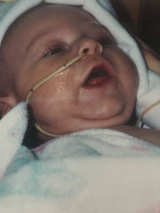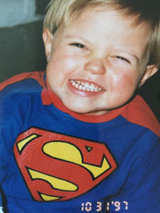Hypoplastic Left Heart Syndrome and Kidney Transplant: Owen’s Story
Hypoplastic Left Heart Syndrome and Kidney Transplant: Owen’s Story
Following Owen’s birth, his parents, Kristin and Marc, had a mere one week of normally enjoying their firstborn before their world turned upside down. After that, they spent several years working just to keep their son alive. Then, when Owen was a teen facing organ failure, his mother was once again able to give him the gift of life.

During Kristin’s pregnancy, the common screenings did not detect any problems, and Owen’s delivery on Aug. 1, 1995, went smoothly. At the pediatrician for his 1-week checkup, Owen seemed fine except for minor jaundice. That afternoon, though, he started fussing, which developed into nonstop crying for hours. His temperature was slightly low. Kristin and Marc alerted the pediatrician, but Owen finally fell asleep.
In the middle of the night, when Kristin checked on Owen, she went into a panic: He seemed lifeless.
“He had gone into congestive heart failure, but we didn’t know it,” says Kristin. “The pediatrician told us to go straight to our local hospital — not the ER but the neonatal intensive care unit.”
The pediatric cardiologist at this New Jersey hospital told the new parents there were three possibilities: If nothing was done, Owen would die; they could list his name on the heart transplant list; or he could undergo the three-stage reconstructive surgery for hypoplastic left heart syndrome (HLHS), a severe birth defect in which the left side of the heart is underdeveloped.
More About HLHS
Hypoplastic left heart syndrome (HLHS) is a severe congenital heart defect in which the left side of the heart is underdeveloped.
A frightening choice

“It was just surreal that these options were what we faced,” says Kristin. “It was my first baby, and you don’t know what a normal baby’s activity should be. But it was August, and my baby’s hands were freezing!” She pauses, still haunted by the memory: “This is how long it’s taken me to be able to tell this story.”
Kristin and Marc knew they had to give their son a chance, so they opted to try the three-stage surgeries, and Owen was transported by helicopter to Children's Hospital of Philadelphia (CHOP).
“He was not in good shape,” says Marc, matter-of-factly. “He was too sick, so he was not a good candidate for immediate heart surgery. He needed the surgery, but he needed to be strong enough to survive it.” His CHOP team watched Owen vigilantly, and his parents waited.
Two long weeks later, Owen was deemed ready for surgery, but his parents understood the gravity of the procedure. “Back then, a perfectly healthy candidate had a 75% success rate,” notes Marc. Owen’s odds were much worse, and there was a chance he’d end up in a vegetative state for the rest of his life, given the ordeal he’d already gone through. Owen underwent the first procedure to repair the HLHS, called the Norwood procedure, “And he came out of it well enough,” says Marc. “The head of the Cardiac Intensive Care Unit called it ‘nothing short of a miracle.’”
‘The scariest day of my life’

Owen was discharged from CHOP on Sept. 10, which Kristin calls “the scariest day of my life. What do I do now? The next several weeks and months we just focused on keeping him alive. He drank a predigested formula, and we had to measure and record every feeding. We had to insert an NG tube overnight for feeding so he’d gain weight. I felt so alone and alienated from any other mother with a baby.”
Kristin and Marc did everything they could, and Owen got healthier and healthier. After six months, he underwent the second open heart surgery, and a year later, the third. He grew up. He went to school. He enjoyed being a kid. “I knew there were some sports I couldn’t participate in, but there was always plenty for me to try,” recalls Owen. But the trauma his body had undergone as a newborn had an effect: His kidneys were terribly damaged.
More About Kidney Transplants
Kidney transplant is an operation in which your child receives a normal kidney from another person to replace their failed kidneys.
Kidney function drops to 7%
“We knew early on about the kidney decline,” says Marc. “By the age of 2, we knew it had to be followed. Because of the insult to his system, one kidney never grew at all, and the other one grew only moderately. It just had to be followed, and it was a matter of ‘when’ he would need a new kidney.” Owen made it through most of his teen years before the kidney damage took its toll.
“In my junior year of high school, I was trying to keep up with all my work, but in the second semester I couldn’t physically do it anymore,” says Owen, now 24. “We went to Florida for vacation, and I couldn’t stay awake.” His kidney function was at only 7%, and dialysis would be too much of a strain on his heart. He needed a kidney transplant.
“With Owen’s kidney decline being fairly rapid at this point, we wanted to schedule a kidney transplant surgery and be proactive in this respect,” says Kristin. In November 2012, both she and Marc were tested to see if they were donor matches. “It was determined that both Marc and I were compatible,” says Kristin, but she was a slightly better match. Kristin would be Owen’s donor. “It certainly was a journey both physically and emotionally that has changed me forever,” she says. “Imagine, giving life to your child, twice.”
Considering Owen’s medical history, the operation required a great deal of planning and a large team, including members from CHOP’s Cardiac Center, the Kidney Transplant Program at CHOP and the transplant surgeons from the Hospital of the University of Pennsylvania (HUP). Kristin’s kidney was procured early in the morning of June 6, 2013, at HUP, then her surgeon hand-delivered it to CHOP and assisted with Owen’s surgery.
“Nearly 13 hours after Kristin left for her surgery, there must have been 20 doctors in his room when he woke up,” Marc recalls. “Within minutes, Owen said, ‘I feel so much better!’”
“I was chewing on ice chips and all I could think was, ‘I need a steak,’” Owen says with a laugh. After six days in Philadelphia with no complications, he and Kristin were discharged.
Adult care ahead
Life now has become rather normal for Owen and his parents — although to a family that has been through so much, a better description would be “extraordinary.” Owen finished high school, started at community college and ended up at Bloomsburg University of Pennsylvania. When it came time for him to pick a major, he discovered communication studies and immediately loved it. He’s now a part of the Lambda Pi Eta Honors Society within his major, with two Dean’s List Letters, and serves as the vice president of the National Communication Association Student Club. He is a Writing Center consultant, assisting students of all levels with their academic writing assignments in addition to being a peer mentor for 25 undeclared freshmen. Currently, Owen is interning with the communications team at the New Jersey hospital where he was first brought when he was 9 days old.
Medically, at 24 years old, Owen is poised to transition to adult care at Penn’s Adult Congenital Heart Center and Kidney Transplant Program. “It’s time,” he says of making the switch. “It’s like I’m graduating high school, and college is Penn. As an adult, decisions about my health will be more in my hands instead of my parents.” But he knows his CHOP team will always be in his corner, supporting him.
I don’t think CHOP will ever be completely out of the picture, and for that I am eternally grateful.